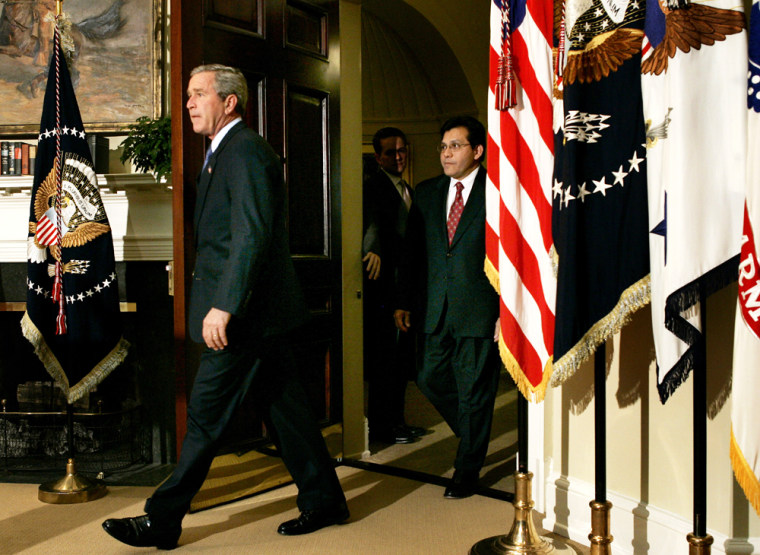In background and temperament, Alberto R. Gonzales, President Bush's choice to be attorney general, could hardly be more different from his predecessor, John D. Ashcroft.
Ashcroft, from Missouri, was the son and grandson of Assemblies of God ministers; Gonzales, 49, was reared in a Roman Catholic Mexican American family in Texas by parents who had been migrant farmworkers.
Ashcroft was hard-charging and the ideological darling of religious conservatives; Gonzales, called "mi abogado" ("my lawyer") by Bush, is soft-spoken, nondogmatic and viewed with suspicion by conservatives.
Ashcroft was a Missouri governor and senator and even attempted a run for the presidency in his three decades in politics; Gonzales was a Houston business lawyer with no political career before he was recruited in 1994 by Bush's gubernatorial campaign.
As White House counsel in Bush's first term, Gonzales was known less for ideology than for loyalty to Bush. Indeed, he could be politically tone-deaf in his zeal to protect the authority of his boss in squabbles with Congress. "The Judge," as colleagues called him because of his brief tenure on the Texas Supreme Court, often sparred with Ashcroft and the other movement conservatives at the Justice Department and played the role of arbiter during the first term, listening to arguments of more dogmatic lawyers in the White House and the Justice Department and seeking consensus.
A tough childhood
Gonzales was born in San Antonio and grew up in Houston. He lived with seven siblings in a home without running water and other modern amenities for much of his youth. After his parents met as migrant workers, his father, who was an alcoholic, worked in construction while his mother stayed home with the children.
Gonzales was a football and baseball player and honor student in high school but enlisted in the Air Force. He eventually attended the Air Force Academy in Colorado Springs, then transferred to Rice University and later went to Harvard Law School. He was the only one in his family to go to college, and the only one to leave Houston.
He told The Washington Post in 2001 that his success, contrasted with that of his siblings, "makes you painfully aware of the inequities in life" and "makes you wonder why a person who has grown up in exactly the same environment is able to succeed."
Squabbles with conservatives
Conservatives have long been wary of Gonzales. The journal Human Events accused him of sounding "like Mario Cuomo." The National Review said a joke among GOP aides in the Senate was "Gonzales is Spanish for Souter," a reference to David H. Souter, the Supreme Court justice nominated by President George H.W. Bush who joined the court's liberal wing.
The distrust dates from Gonzales's days on the Texas Supreme Court in 2000, when he joined a majority of the judges in upholding a pregnant teenager's right to seek an abortion without notifying her parents. Taking aim at two conservative dissenters in the case, Gonzales wrote that they were engaged in "unconscionable judicial activism."
Those words came back to haunt Bush when he appointed one of the two dissenters, Priscilla R. Owen, to a federal appeals court — and Senate Democrats threw Gonzales's words back in the White House's face. The Owen nomination failed.
Gonzales also has squabbled with conservatives in the administration over affirmative action. When the use of race in admissions at the University of Michigan came before the Supreme Court in 2003, Gonzales argued fiercely that the administration should not take a hard-line position in favor of the white students who were claiming that the school had made them victims of "reverse discrimination."
This put him at odds with administration conservatives led by Ashcroft and then-Solicitor General Theodore B. Olson, but Gonzales ultimately prevailed in the sense that the administration ended up pressing a narrow argument that objected only to the way in which Michigan had pursued diversity, not to the diversity rationale for affirmative action itself. The court sided with the Michigan law school in a 5 to 4 ruling.
Behind the scenes, Gonzales clashed frequently with Ashcroft's Justice Department. He felt blindsided when Ashcroft, early in the administration, announced that the department would embrace, for the first time ever, a view of the Second Amendment that regards gun possession as an individual right on a par with freedom of speech or religion.
Gonzales and Ashcroft were in an ongoing wrangle over control of the pivotal Office of Legal Counsel, the Justice Department's in-house adviser on constitutional matters. The OLC became particularly important after Sept. 11, 2001, when the administration was pushing for new legal authority to pursue the war on terrorism. Gonzales's most public controversy was his role in administration memos regarding the treatment of prisoners taken in the war on terrorism.
But many of the controversies on his watch were less his doing than those of underlings and other young conservative lawyers in the administration.
"I don't think he's ever really had a chance to express his views on major policy issues," said Edwin Meese III, the Reagan administration attorney general now with the Heritage Foundation. "The job of the White House counsel is to be an attorney." As he goes from being the president's abogado to the country's, all signs are that Gonzales will remain faithful — not necessarily to conservative ideology, but to Bush.
Staff writer Charles Lane contributed to this report.
